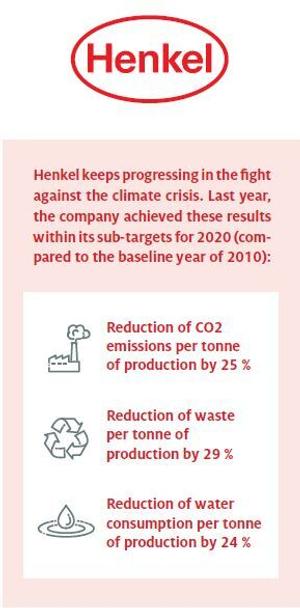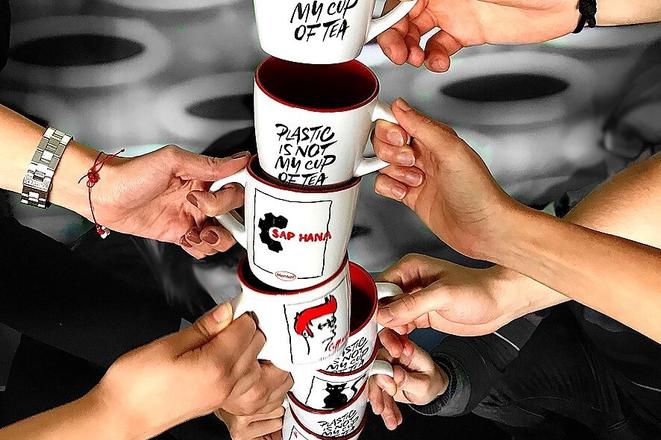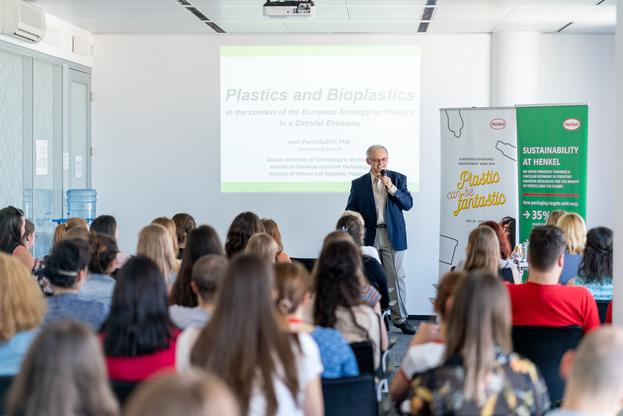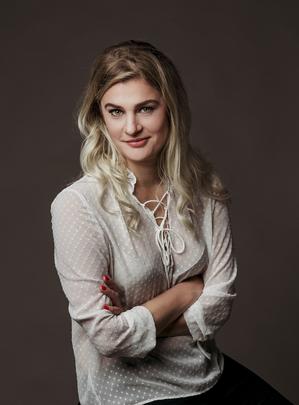HOW MUCH PLASTIC CAN YOU SEE AROUND YOU RIGHT NOW? HOW MANY PRODUCTS WRAPPED OR PACKED IN PLASTIC HAVE YOU BOUGHT THIS WEEK? USING PLASTICS IN EVERYDAY LIFE CANNOT ALWAYS BE AVOIDED. HOWEVER, NOT ALL THE PLASTICS THAT ACCOMPANY US THROUGH OUR LIVES ARE HARMFUL TO NATURE. LAST YEAR, THE EMPLOYEES OF HENKEL SLOVENSKO LEARNED HOW TO ELIMINATE THE HARMFUL PLASTIC AROUND THEM AND HOW TO ADOPT A MEANINGFUL APPROACH TO THE PLANET, EVEN AT WORK.
One day, when employees came to work, the big plastic containers for water were gone. They were replaced by glass carafes and mugs with a fitting sign: “Plastic is not my cup of tea.” No one has shed a tear for the plastic containers and disposable cups. People in Henkel Slovensko welcomed this change and took the opportunity to personalise their mugs with the help of calligraphists, whom the company invited on the day of its anniversary.
It may seem like a small detail, but in the last quarter alone the company has saved over 5,500 cups and eliminated the energydemanding transport of the
water containers to and from the company. This surprise, which came in September, was not the first activity at Henkel Slovensko with focus on the global problem with plastic waste. In order not to preach water but drink wine, and since our products also have plastic packaging, we organised a week full of lectures and workshops with advice on how to use less plastic at home as well as at work at the initiative of our employees.
Plastic can be fantastic...
...is the name of the campaign, which should give the employees of Henkel Slovensko an overview of what the company itself is doing in the sphere of plastics. The company understands its responsibility for the amount of plastic waste and wants every single employee to be aware of the steps we are taking towards sustainability. The “Plastic can be fantastic” campaign explained that there are different kinds of plastic. Many of the packaging materials used by Henkel for its products contain a portion of recycled plastic. For example, in our Fa shower gels, this portion is 30 %. Henkel Slovensko prepared workshops for its employees about new, harmless packages, changes in the formulas of the time-tested products and the education of end consumers since they are responsible for 90 % of the product’s carbon footprint.
Our goal was, with the help of experts, to present useful and practical information about recycling, separating, composting and proper treatment of plastic, as well as to disprove many myths and make an appeal to individuals to change their behaviour.“
A world-renown expert on microplastics, professor Pavel Alexy of the Slovak University of Technology in Bratislava, acquainted our employees with new technologies, which have the potential of changing the whole industry. IKEA experts also provided them with some inspiration on how to make their home more sustainable.
You could have plastic from Haiti at home

Our inspiration did not end with Slovak experts. The employees of Henkel Slovensko got the opportunity to talk about the new ways of fighting plastic waste in oceans with the founder of Plastic Bank, David Katz of Canada. His organisation fights against poverty in the countries like Haiti or the Philippines by exchanging plastics collected from beaches for the things local people need. In this way, they can get school fees covered for their children or mobile data. Henkel is one of the founding partners of the project, and beside providing financial support, it also supports it with its business –we use the collected and recycled plastics in the packages of our Fa shower gel and Nature Box shampoo. During the meeting the employees came up with many ideas on how to develop the project to include other products as well.
"Many of Henkel Slovensko’s initiatives are coming directly from employees themselves. They can identify where we have room for improvement, and all we have to do is to listen to them, develop their ideas and implement the best ones. They hold us accountable, and we do the same for them – in this way we keep reminding each other that the result is our common responsibility. It is all about the people, their behaviour, and therefore we try to disprove the myths about plastics and encourage our employees to make a change. Plastics are not bad at all, for example in the health care sector, we could not exist without them. It is important how we handle them, if we separate, recycle and reuse them. If we all alter our habits in favour of environmental protection, change will happen,” said Zuzana Kaňuchová, Cluster Head of Corporate Communications CEE in Henkel Slovensko.


 Sustainabitlity at Henkel
Sustainabitlity at Henkel
 Zuzana Kaňuchová
Zuzana Kaňuchová